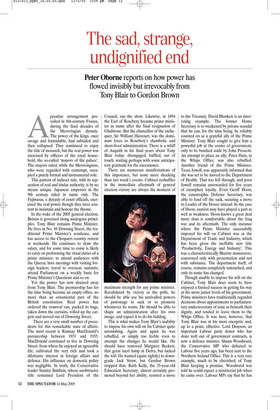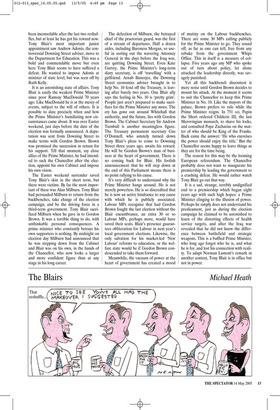The sad, strange, undignified end
Peter Oborne reports on how power has flowed invisibly but irrevocably from Tony Blair to Gordon Brown Apeculiar arrangement prevailed in 8th-century France, during the final decades of the Merovingian dynasty. The power of the kings, once savage and formidable, had subsided and then collapsed. They continued to enjoy the title of monarch, but the real power was exercised by officers of the royal household, the so-called ‘mayors of the palace’. The mayors ruled, while the Merovingians, who were regarded with contempt, occupied a purely formal and instrumental role.
This pattern of indirect rule, with its separation of real and titular authority, is by no means unique. Japanese emperors in the 9th century ruled in name only. The Fujiwaras, a dynasty of court officials, exercised the real power though they were content to maintain and honour the throne.
In the wake of the 2005 general election, Britain is governed along analogous principles. Tony Blair remains Prime Minister. He lives in No. 10 Downing Street, the traditional Prime Minister’s residence, and has access to the Chequers country retreat at weekends. He continues to draw the salary, and for some time to come is likely to carry on performing the ritual duties of a prime minister: to attend audiences with the Queen; host meetings with visiting foreign leaders; travel to overseas summits; attend Parliament on a weekly basis for Prime Minister’s Questions and so on.
Yet the power has now drained away from Tony Blair. The premiership has for the time being become an empty office, no more than an ornamental part of the British constitution. Real power has ordered the removal van, packed its bags, taken down the curtains, rolled up the carpets and moved out of Downing Street.
There are a very small number of precedents for this remarkable state of affairs. The most recent is Ramsay MacDonald’s premiership between 1931 and 1935. MacDonald continued to live in Downing Street, from where he enjoyed an agreeable life, cultivated the very rich and took a dilettante interest in foreign affairs and defence. His influence on domestic policy was negligible. In truth, the Conservative leader Stanley Baldwin, whose unobtrusive title remained Lord President of the Council, ran the show. Likewise, in 1894 the Earl of Rosebery became prime minister in name after the final resignation of Gladstone. But the chancellor of the exchequer, Sir William Harcourt, was the dominant force in Rosebery’s shambolic and short-lived administration. There is a whiff of Asquith in his final years about Tony Blair today: disengaged, baffled, out of touch, waiting perhaps with some anticipatory gratitude for the executioner.
There are numerous manifestations of this impotence, but none more shocking than last week’s events. Cabinet reshuffles in the immediate aftermath of general election victory are always the moment of maximum strength for any prime minister. Revalidated by victory at the polls, he should be able use his unrivalled powers of patronage to sack or to promote whomever he wants. He should be able to shape an administration after his own image, and expect it to do his bidding.
This is what makes Tony Blair’s inability to impose his own will on his Cabinet quite astonishing. Again and again he was rebuffed, or simply too feeble even to attempt the changes he would like. He should have removed Margaret Beckett, that great inert lump at Defra, but lacked the will. He wanted (quite rightly) to downgrade Jack Straw, but Gordon Brown stopped that. Ruth Kelly, the 35-year-old Education Secretary, almost certainly promoted beyond her ability, resisted a move to the Treasury. David Blunkett is an interesting example. The former Home Secretary is so weakened by private scandal that he can, for the time being, be reliably counted on as a grateful ally of the Prime Minister. Tony Blair sought to give him a powerful job at the centre of government, only to be brushed aside by John Prescott. An attempt to place an ally, Peter Hain, in the Whips Office, was also rebuffed. Another friend of the Prime Minister, Tessa Jowell, was apparently informed that she was set to be moved to the Department of Health. That too fell through, and poor Jowell remains unrewarded for five years of exemplary loyalty. Even Geoff Hoon, the catastrophic Defence Secretary, was able to fend off the sack, securing a move to Leader of the House instead. In the case of Hoon, caution may have played a part as well as weakness. Hoon knows a great deal more than is comfortable about the Iraq war and its aftermath. The only instance where the Prime Minister successfully imposed his will on Cabinet was at the Department of Trade and Industry, which has been given the ineffable new title ‘Productivity, Energy and Industry’. This was a characteristically Blairite manoeuvre, concerned only with presentation and not with substance. The department itself, of course, remains completely untouched, and only its name has changed.
Though unable to impose his will on the Cabinet, Tony Blair does seem to have enjoyed a limited success in getting his way at the more junior levels of his government. Prime ministers have traditionally regarded decisions about appointments to parliamentary undersecretary of state as beneath their dignity, and tended to leave them to the Whips Office. It was here, however, that Tony Blair was at his most energetic and, up to a point, effective. Lord Drayson, an important Labour party donor who has done well out of government contracts, is now a defence minister. Shaun Woodward, the Conservative MP who defected to Labour five years ago, has been sent to the Northern Ireland Office. This is a very rare example, much to be cherished, of Tony Blair keeping a promise. Woodward was told he could expect a ministerial job when he came over. Labour MPs say that he has been inconsolable after the last two reshuffles, but at least he has got his reward now. Tony Blair’s most important junior appointment saw Andrew Adonis, the controversial Downing Street adviser, move to the Department for Education. This was a bold and commendable move but even here Tony Blair seems to have suffered a defeat. He wanted to impose Adonis at minister of state level, but was seen off by Ruth Kelly.
It is an astonishing state of affairs. Tony Blair is easily the weakest Prime Minister since poor Ramsay MacDonald 70 years ago. Like MacDonald he is at the mercy of events, subject to the will of others. It is possible to date precisely when and how the Prime Minister’s humiliating new circumstances came about. It was over Easter weekend, just days before the date of the election was formally announced. A deputation was sent from Downing Street to make terms with Gordon Brown. Brown was promised the succession in return for his support. Till that moment, say close allies of the Prime Minister, he had intended to sack the Chancellor after the election, appoint his own Cabinet and impose his own vision.
The Easter weekend surrender saved Tony Blair’s skin in the short term, but there were victims. By far the most important of these was Alan Milburn. Tony Blair had persuaded Milburn to return from the backbenches, take charge of the election campaign, and be the driving force in a third-term government. Tony Blair sacrificed Milburn when he gave in to Gordon Brown. It was a terrible thing to do, with unthinkable personal consequences. A prime minister who constantly betrays his own supporters is nothing. By midnight on election day Milburn had announced that he was stepping down from the Cabinet and Blair was on his own, in the hands of the Chancellor, who now looks a larger and more confident figure than at any stage in his long career. The defection of Milburn, the betrayed chief of the praetorian guard, was the first of a stream of departures. Half a dozen aides, including Baroness Morgan, so useful in sorting out the wavering Attorney General in the days before the Iraq war, are quitting Downing Street. Even Kate Garvey, the Prime Minister’s long-term diary secretary, is off ‘travelling’ with a girlfriend. Arnab Banerjee, the Downing Street economics adviser brought in to help No. 10 fend off the Treasury, is leaving after barely two years. One Blair ally says the feeling in No. 10 is ‘pretty grim’. People just aren’t prepared to make sacrifices for the Prime Minister any more. The cry has gone out around Whitehall that authority, and the future, lies with Gordon Brown. The Cabinet Secretary Sir Andrew Turnbull is another meaningless figure. The Treasury permanent secretary Gus O’Donnell, who astutely turned down Tony Blair’s pleas to come to Downing Street three years ago, awaits his reward. He will be Gordon Brown’s man of business at the heart of government. There is no coming back for Blair. His foolish announcement that he will step down at the end of this Parliament means there is no point rallying to his cause.
It’s very difficult to understand why the Prime Minister hangs around. He is not merely powerless. He is so discredited that he is now an active hindrance to any cause with which he is publicly associated. Labour MPs recognise that had Gordon Brown fought the last election without the Blair encumbrance, an extra 30 or so Labour MPs, perhaps more, would have saved their seats. Blair’s presence guarantees obliteration for Labour in next year’s local government elections. Likewise, the only salvation for his market-led ‘New Labour’ reforms to education, or the welfare state would be if Gordon Brown condescended to take them forward.
Meanwhile, the vacuum of power at the heart of government has created a mood of mutiny on the Labour backbenches. There are some 30 MPs calling publicly for the Prime Minister to go. They sound off, as far as one can tell, free from any rebuke from the government Whips Office. This in itself is a measure of collapse. Five years ago any MP who spoke out of turn about policy, let alone attacked the leadership directly, was savagely punished.
Yet all this backbench discontent is mere noise until Gordon Brown decides to mount his attack. At the moment it seems to suit the Chancellor to keep this Prime Minister in No. 10. Like the mayors of the palace, Brown prefers to rule while the Prime Minister reigns. In 751 AD, Pepin the Short ordered Childeric III, the last Merovingian monarch, to shave his locks, and consulted Pope Zacharias on the matter of who should be King of the Franks. Back came the answer: ‘He who exercises the power should enjoy the title.’ But the Chancellor seems happy to leave things as they are for the time being.
The reason for this may be the looming European referendum. The Chancellor probably does not want to inaugurate his premiership by leading the government to a crashing defeat. He would rather watch Tony Blair go out that way.
It is a sad, strange, terribly undignified end to a premiership which began eight years ago with such high hopes: a Prime Minister clinging to the illusion of power. Perhaps he simply does not understand his predicament, just as during the election campaign he claimed to be astonished to learn of the distorting effects of health service targets, and after the Iraq war revealed that he did not know the difference between battlefield and strategic weapons. This is a baffled Prime Minister, who long ago forgot who he is, and what he is for, and lost his connection with reality. To adapt Norman Lamont’s remark in another context, Tony Blair is in office but not in power.



































































 Previous page
Previous page